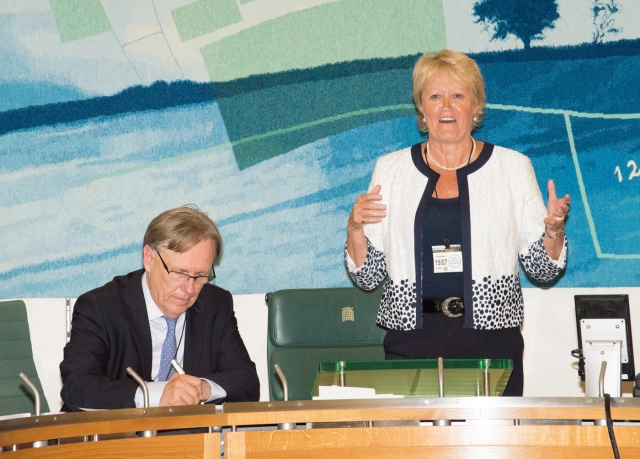New NHS England Commissioning Framework for Hearing Loss services welcomed by Alliance
27 July 2016

Brian Lamb, Chair of the Hearing Loss and Deafness Alliance, and Sue Hill, Chief Scientific Officer for England, at the launch of the Commissioning Framework
The new National Commissioning Framework for Hearing Loss Services was launched by NHS England's Chief Scientific Officer for England, Professor Sue Hill OBE, at the House of Commons on Tuesday 19th of July. The Framework provides a comprehensive guide for organisations responsible for planning and commissioning local hearing services for those with hearing loss. The framework establishes what effective commissioning looks like for CCGs by:
1. Ensuring CCGS are supported when choosing good value services for their local populations
2. The needs of local people are met by high quality integrated care
3. Addressing access and outcome inequalities
4. Improving patient choice when it comes to selecting services
5. Contracting and monitoring outcomes and referrals from all providers to ensure consistency
The Alliance has welcomed the introduction of the Framework as establishing a clear set of expectations about how planners and commissioners should ensure that the needs of their local populations are met. It also makes clear the importance of early intervention to address hearing loss and the serious health and social consequences that hearing loss can lead to if not addressed. Brian Lamb, Chair of the Hearing Loss and Deafness Alliance, welcomed the publication and urged all commissioners and health planners to take full account of the new framework in future commissioning decisions and to work closely with their local communities to ensure the system intervenes early to address hearing loss.
The Commissioning Framework can be accessed at
www.england.nhs.uk/2016/07/hearing-loss-services/
The Framework was co-produced with support from Alliance members.
Action on Hearing Loss has produced some guidance on what the Commissioning Framework means for people with hearing loss, see: www.actiononhearingloss.org.uk/commissioningframework
The Alliance has now produced a statement on the Commissioning Framework;
"The Commissioning Framework aims to guide CCGs, NHS regional teams and STP clusters to commission services that will help people to address hearing loss in a cost effective way in line with latest evidence and need.
The Framework includes the growing evidence of the impact hearing loss has on people's health, wellbeing, relationships, social functioning and mental health. It highlights how early intervention is both effective and important in maintaining independence and healthy, active lives and provides evidence that overturns many of the myths surrounding hearing aids, showing that the vast majority of patients benefit from using their prescribed hearing aids, achieving cost-effective, long-term hearing outcomes and wider benefits. It also sets out what patients say they want from a good hearing service.
CCGs should use the Framework as a basis for discussion and agreement with providers, patients and the public on how to address hearing loss locally and increase the quality, accessibility and cost-effectiveness of NHS services.
When applied at CCG, NHS regional or STP level the Commissioning Framework will ensure that CCGs, NHS Trusts and community providers:
- plan, commission and deliver accessible services that are based on evidence and local need;
- increase levels of awareness of how important effective hearing is in all aspects of everyday life, especially in maintaining healthy, active, independent lives, social interaction and mental health;
- take steps to identify and respond effectively to hearing loss across the whole health and social care system, increasing the numbers who get timely help;
- monitor outcomes and improve the quality, accessibility and value of services;
- do not restrict access to hearing aids or services to those who need them
- comply fully with their statutory duties , NHS regulations, Right Care principles, the NHS Five Year Forward View and the NHS Operational Planning and Contracting Guidance 2017-2019"

 Home
Home
